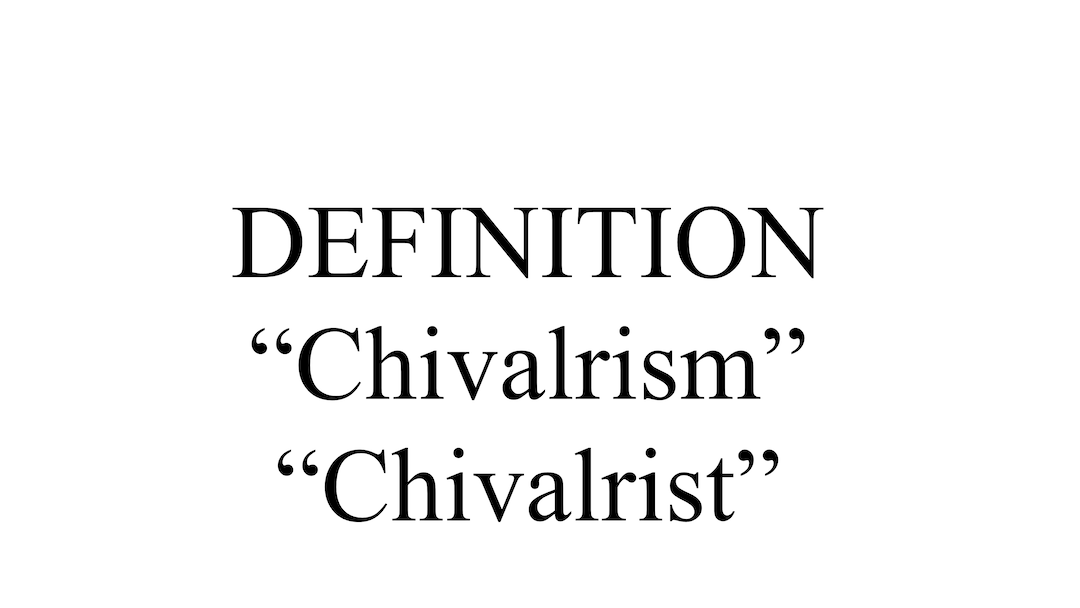New Moral Order™
CHIVALRISM, CHIVALRIST
Definition of the words “Chivalrism” & “Chivalrist”
#Chivalrism
CHIVALRISM, CHIVALRIST
Noun.
[ shiv–uhl-riz-uhm ,shiv–uhl-rist ]
Summary Definition of “Chivalrism” and “Chivalrist”
Chivalrism refers to the established natural and innate masculine desire to serve, protect and defend the feminine, the aged, and the presently (in person and subjectively) vulnerable within human society.
Full Definition of “Chivalrism” and “Chivalrist”
Chivalrism refers to the established natural and innate masculine desire to serve, protect and defend the feminine, the aged, and the presently (in person and subjectively) vulnerable within human society.
A Chivalrist is someone who thinks and behaves in line with the principles of Chivalrism.
Chivalrism draws upon, but is not equivalent to, the medieval principles of ‘chivalry’. It might be said that Chivalrism is chivalry without the violence, attitude and ego.
Chivalrism is founded in the eternal principle that the masculine element within the material universe must aim to be in service to the feminine aspect if it is to be good; godly; divine. In this regard, the ‘masculine’ and ‘feminine’ must be seen more in terms of a ‘yin – yang’ perspective, rather than in terms of a simplistic ‘male – female’ perspective.
Much of the practices of Chivalrism may be seen within the 19th and 20th century English principles of civilised behaviour, which served to advance the earlier principles of chivalry into the modern age.
Chivalrism further defines those English ‘manners’ into the 21st century.
As stated, although Chivalrism should be viewed from a masculine-feminine viewpoint rather than a male-female one, the eternal and historically substantiated role of the human man defending the woman and child cannot be ignored or underestimated in defining Chivalrism.
Even the most anti-male and anti-human media institutions still promote the vulnerability of women and children in situations such as war and disaster, as well as being more likely to be victims of society, while equally promoting the capacity of men to resolve such circumstances. This illustrates the clear and enduring reality that resolving adversity and hardship at the immediate (on hand) social level is the general command of the masculine aspect within human society.
Chivalrism should in no way be regarded in connection to the constructed credo of ‘toxic masculinity’, as it is, in fact, the antithesis of ‘toxic masculinity’, ‘toxic femininity’ and ‘toxic genderism’.
Chivalrism is rooted in a respect for everyone as a sovereign individual who must take responsibility for their own actions and shortcomings, and is founded in the principle of serving others, in a wholly peaceful, humble and considerate manner.
At a fundamental level, the Chivalrist follows the old adage that “manners maketh man”. Holding a door open (with a smile) for anyone, and not just a woman, an elderly person, a disabled person, or a child, shows manners. A society that is losing such manners, is a society in decline, and a society without such manners, is an uncivilised one.
Chivalrism sustains the civility of the individual within society, and in doing so maintains the civilisation of society itself.
If the masculine (not simply the man) always seeks to serve the feminine (not simply the woman) within society, then society will become ever more peaceful; more refined; and more prosperous.
Once the masculine seeks to control the feminine within society, it will become ever more violent; more corrupted; and more impoverished.
See more important new definitions
of words and terms for a better society
at the New Moral Order™ Lexicon.
